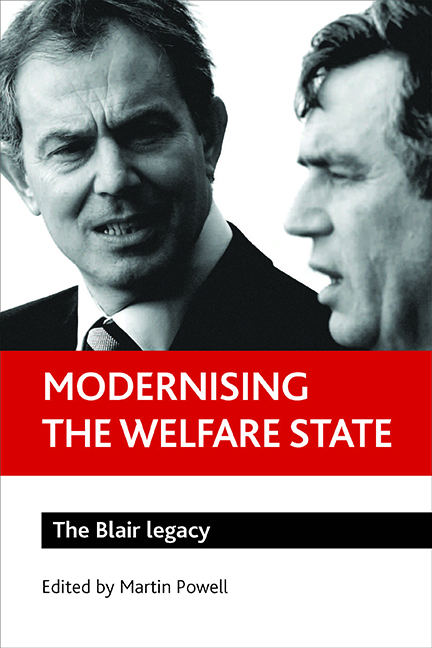Book contents
- Frontmatter
- Contents
- List of tables and figures
- Acknowledgements
- Notes on contributors
- one Introduction: modernising the welfare state
- two The NHS after 10 years of New Labour
- three Housing policy: coming in out of the cold?
- four Social security and welfare reform
- five Social care under Blair: are social care services more modern?
- six Education: from the comprehensive to the individual
- seven Controlling crime and disorder: the Labour legacy
- eight Social investment: the discourse and the dimensions of change
- nine Risk and the Blair legacy
- ten Going private?
- eleven Choice in public services: ‘no choice but to choose!’
- twelve The conditional welfare state
- thirteen The stages of New Labour
- fourteen Social Democratic reforms of the welfare state: Germany and the UK compared
- fifteen Conclusion: the Blair legacy
- Index
- Also available from The Policy Press
eight - Social investment: the discourse and the dimensions of change
Published online by Cambridge University Press: 21 January 2022
- Frontmatter
- Contents
- List of tables and figures
- Acknowledgements
- Notes on contributors
- one Introduction: modernising the welfare state
- two The NHS after 10 years of New Labour
- three Housing policy: coming in out of the cold?
- four Social security and welfare reform
- five Social care under Blair: are social care services more modern?
- six Education: from the comprehensive to the individual
- seven Controlling crime and disorder: the Labour legacy
- eight Social investment: the discourse and the dimensions of change
- nine Risk and the Blair legacy
- ten Going private?
- eleven Choice in public services: ‘no choice but to choose!’
- twelve The conditional welfare state
- thirteen The stages of New Labour
- fourteen Social Democratic reforms of the welfare state: Germany and the UK compared
- fifteen Conclusion: the Blair legacy
- Index
- Also available from The Policy Press
Summary
Introduction
This chapter assesses the nature and scope of changes to the welfare state in relation to the ‘social investment’ turn. We argue that Tony Blair's New Labour governments recalibrated welfare state priorities, programmes and expenditures, both as a response to social risk and to promote economic competitiveness, through an embrace of social investment discourses and practices. While social investment, at its core, is all about activation (that is, labour market policy ‘concerned with helping people successfully master transitions across the life-course’; see Giddens, 2007, p xi), it has nevertheless ‘activated’ far wider realms and actors than initially anticipated, having an impact on policy ideas and instruments, as well as institutions, interests and identities (Dobrowolsky and Saint-Martin, 2005), with implications beyond the conditional welfare state (see Chapter Twelve, this volume).
6 and Peck suggest that modernisation represented more than ‘some general slogan’ (2004, p 4). Similarly, social investment was not just about words (Dobrowolsky, 2002; Dobrowolsky and Jenson, 2005). It required ‘coordination and integration’ and involved various processes of ‘standard setting’, targeting and benchmarking (for example, reducing child poverty by 2020). Social investment policies reflected ‘devolution but limited decentralisation’ and typically played out in terms of ‘area-based initiatives’ (for example, Sure Start). At the same time, we see both an ‘extended role for private capital’ (for example, public–private partnerships, or PPPs) as well as an ‘increase in citizen obligations’. Consequently, social investment, like modernisation, produced an ‘organisational settlement’.
The actual term ‘social investment’ was coined by Anthony Giddens (1998, p 117). His view that states should manage risk (1994), his advocacy of partnerships between states, markets, families and communities with respect to welfare provision, as well as his conceptualisation of social investment, intended as a term that would foreground human capital (1998), encapsulate the principles of a Blair government that would describe itself as ‘maximising opportunities and minimising risks’. Giddens recently offered the following concise definition for the social investment state: ‘State-provided or regulated investments in human or social capital’ (2007, p xiii).
In brief, under the rubric of social investment, social policy reforms were geared towards excelling in the competitive global marketplace. Investing in human capital – increasing the capacity of everyone to engage in the productive economy – became a core preoccupation.
- Type
- Chapter
- Information
- Modernising the Welfare StateThe Blair Legacy, pp. 125 - 142Publisher: Bristol University PressPrint publication year: 2008



